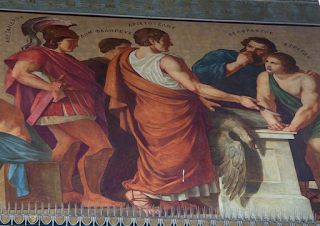 |
| "Open the Lyceum Doors to the Public Now" |
Obscurantism
was the theme of a lecture I gave at Northwestern University near Chicago today. Aristotle, who wrote some challenging 'esoteric' books, also gave accessible public lectures at his Lyceum to explain his work (they were called 'exoteric' and sadly have not been preserved). This was good academic practice.
Scholars
today use unnecessary obscurity when communicating with one another. We make far too
little effort to express our findings in ways that non-specialists can
understand. For hilarious examples, see the submissions to the 1990s Bad Writing Contest, which I would
like to re-establish.
 |
| Occluding Truth Can Appear Impressive |
Academic
obscurantism happens for three reasons. First, laziness. It takes less effort to express
complicated ideas in the dialect of people sharing our assumptions than to express them in the dialect of other tribes. Second, careerism: we are sometimes rewarded for displaying command of specialist jargon, especially if it conceals a lack of anything significant to say, to cheering peers. Third,
elitism. Making ourselves incomprehensible to most of our fellow citizens can
help us police the ownership of intellectual ideas and access to university
places and jobs.
But
we are at a point in history where custodianship of the truth, and skills in
critical analysis of public discourse, have never been more important. For obscurantism, justifiably associated in the public imagination with wildly out-of-touch professors and
pretentious art critics, is also an invaluable instrument in the toolkit of
tyrants. Plato knew this when he defended the ‘Noble Lie’ as propagated by
State Guardians.
At
its crudest, 'populist'-tyrannical obscurantism takes the form of inventing terrorist
attacks or straightforward concealment of the truth. It can obfuscate the nefarious
workings of capitalism: the Special Purpose Vehicles (SPVs) invented by American
banks, which precipitated the 2008 financial crisis, were simply a clever label for the
illicit hiding of debts.
 |
| "Who Said I Had No Sense of Humour?" |
This week, Stephen K. Bannon, who is committed to the wholesale public obfuscation of real financial and political hierarchies and injustices, cracked a joke. This was pointed out by my my friend Sara Monoson, Head of Northwestern's Department of Political Science.
Bannon told the Conservative Political Action Conference that his goal was nothing less than
the ‘deconstruction
of the administrative state.’ Being, perhaps unexpectedly, a bookish person himself, he knows that the word ‘deconstruction’ is
intimately associated by the public, even if they have not heard of Jacques Derrida, with their stereotype of the smug left-liberal
intellectual snob.
 |
| With Professor Monoson |
Bannon,
an arch-obscurantist, may not have had them rolling in the aisles with his pun. But he has brilliantly co-opted the very term which is emblematic of
what Trump’s supporters see as the ‘irrelevant’, unpatriotic and privileged
intelligentsia, moving seamlessly between elite universities, the hated media
and the Washington ‘political class’.
The Obscurantism Wars have been declared. We need to stand up for what Aristotle would have called the median virtue of clarity between the Scylla of wordy academic obscurantism on the one hand, and the Charybdis of political obscurantism masquerading as 'ordinary-person-commonsense-speak' on the other. It’s time for academics to step down from their Ivory Towers, stand up for old-fashioned values like clarity and truth, and do some plain speaking for once.
The Obscurantism Wars have been declared. We need to stand up for what Aristotle would have called the median virtue of clarity between the Scylla of wordy academic obscurantism on the one hand, and the Charybdis of political obscurantism masquerading as 'ordinary-person-commonsense-speak' on the other. It’s time for academics to step down from their Ivory Towers, stand up for old-fashioned values like clarity and truth, and do some plain speaking for once.












